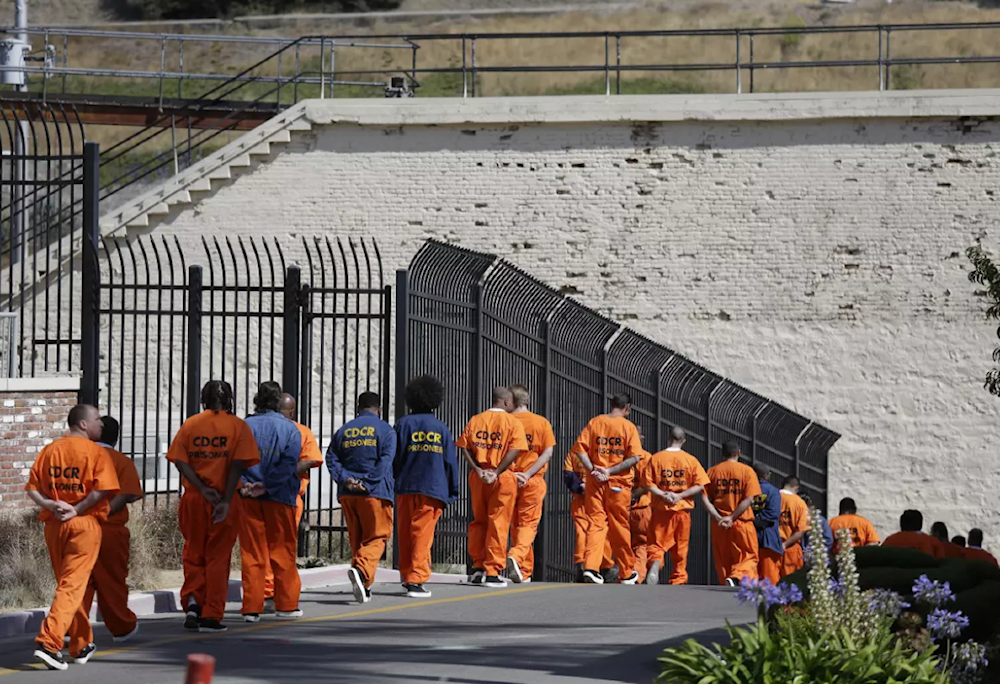California voters reject measure to ban forced prison labor
Colorado, Tennessee, Alabama, and Vermont, have voted to remove forced labor provisions from their constitutions in recent years, and Nevada joined them this week by passing its own legislation.
-

In this August 16, 20216 photo, a row of general population inmates walk in a line at San Quentin State Prison in San Quentin, California. (AP)
California voters have rejected Proposition 6, which sought to prohibit forced prison labor, disappointing criminal justice reform advocates and the state’s 90,000 inmates.
The proposition aimed to amend the state constitution to end involuntary servitude for incarcerated individuals, offering them the option to choose their own work or participate in voluntary labor programs.
Currently, California allows forced prison labor under an exemption in the state constitution, with about 40,000 inmates working in tasks such as firefighting and janitorial services for as little as $0.75 an hour. Many prisoners rely on this meager income to purchase essentials like food.
Despite support from reformers, including the ACLU, who highlight the exploitative nature of prison labor, the proposition was rejected by 53.8% of voters, with 46.2% in favor.
According to the ACLU, more than 65% of prisoners imprisoned in California have reported being compelled to work, as the state benefits from the incredibly cheap labor.
California Governor Gavin Newsom signed legislation in September to deliver a formal apology for the state's history of bigotry against Black Americans. However, state lawmakers blocked a bill that would have established an agency to oversee reparations programs, and the California governor vetoed legislation that would have assisted Black families in reclaiming land stolen unfairly by the government through eminent domain.
Lori Wilson, the California Assemblywoman who pushed Proposition 6, told The Guardian last month that the bill was "inspired by the ongoing need to correct a constitutional injustice," and detailed it was a "remnant of our nation's dark history with slavery."
Colorado, Tennessee, Alabama, and Vermont, have voted to remove forced labor provisions from their constitutions in recent years, and Nevada joined them this week by passing its own legislation.
In Colorado, the first state to remove a slavery provision from its constitution in 2018, jailed inmates claimed in a 2022 lawsuit filed against the correctional system that they were still forced to work.
'Legalized plantations'
Because the California constitution was altered in the 1970s to eliminate an exemption for slavery, Proposition 6's ballot text did not expressly include the word "slavery" like measures elsewhere. However, the exception is involuntary slavery as a penalty for crime.
Despite its rejection, proponents emphasized the importance of the concept. Jamilia Land, co-founder of the Abolish Slavery National Network and a supporter of Prop 6, stated that the initiative, along with similar ones in other states, is about "dismantling the remnants of slavery" from the books.
"While the voters of California did not pass Proposition 6 this time, we have made significant progress," she divulged in a statement. "We are proud of the movement we have built, and we will not rest until we see this issue resolved once and for all."
“We know Californians, including victims, want a system that centers rehabilitation, accountability, and a path to safer communities. It is clear we have more work to do to educate Californians about involuntary servitude. The race for justice is not to the swift, but those who endure.”
According to the California secretary of state's office, Proposition 6 received the second-lowest amount of campaign funding among the ten statewide initiatives on the ballot this year, totaling around $1.9 million.
Calling prisons "legalized plantations," Dante Jones, a 41-year-old detained in San Quentin, told the Guardian last month that "they want to rehabilitate us, but then they don’t do anything that allows that to happen. Technically, by the constitution, we’re slaves and they can whip our backs.”

 4 Min Read
4 Min Read








